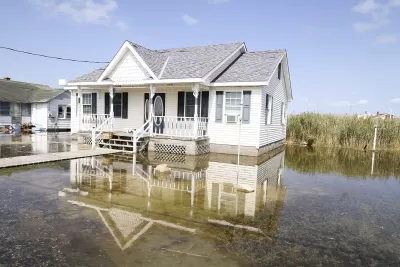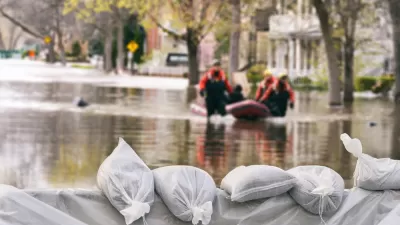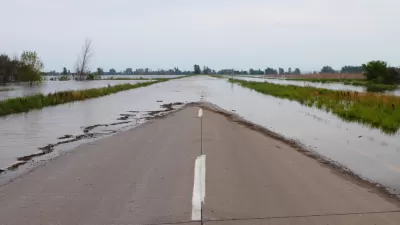As climate-driven flooding and storms put increasing pressure on coastal communities, some say the piecemeal nature of federal recovery and mitigation efforts aren’t cutting it.

Coastal communities are increasingly threatened by sea level rise and severe weather events. As a growing number of residents face the decision to stay or go, experts are calling for a more comprehensive, coordinated response to recovery, resilience, and buyouts.
“[M]any hundreds of communities in the US could soon be facing the same heart-wrenching choice. Even under optimistic scenarios, scientists predict that by 2100 some 4.2 million Americans across 500 coastal communities will experience ‘disruptive inundation,’” Timothy Shuler reports a reporter for Next City. That’s the case for residents in Oyster, Virginia, where sea level has risen by a foot and a half.
The financial strain of flood damage—expected to jump by 30 percent by 2050 from $9.4 billion today to $12.8 billion for federally backed mortgages, according to the Congressional Budget office—combined with patchy federal preparedness and response programs that often disproportionately disadvantage low-income and BIPOC communities, have led some experts to ask if a entirely new federal entity is necessary. Some are proposing “a department that could plan and coordinate the challenging process of relocation and adaptation known as managed retreat.”
Creating a single agency would avoid the siloed and conflicting responses after major disasters, such as after Hurricane Matthew in 2016, when the Federal Emergency Management Agency began funding floodplain buyouts in Princeville, North Carolina at the same time the US Army Corps of Engineers was spending hundreds of thousands of dollars on a plan to better protect the town and the state was pushing community-wide relocation.
“There’s no thread that connects the investment [of a buyout] to something that is actually meaningful. There’s nothing that follows the dot all the way through,” Kate Orff, faculty director of Columbia University’s Center for Resilient Cities and Landscapes told CityLab. She said what’s needed “is a program that actually looks more synthetically at how all of these things come together.”
FULL STORY: Who Will Manage the US Climate Retreat?

Maui's Vacation Rental Debate Turns Ugly
Verbal attacks, misinformation campaigns and fistfights plague a high-stakes debate to convert thousands of vacation rentals into long-term housing.

Planetizen Federal Action Tracker
A weekly monitor of how Trump’s orders and actions are impacting planners and planning in America.

In Urban Planning, AI Prompting Could be the New Design Thinking
Creativity has long been key to great urban design. What if we see AI as our new creative partner?

King County Supportive Housing Program Offers Hope for Unhoused Residents
The county is taking a ‘Housing First’ approach that prioritizes getting people into housing, then offering wraparound supportive services.

Researchers Use AI to Get Clearer Picture of US Housing
Analysts are using artificial intelligence to supercharge their research by allowing them to comb through data faster. Though these AI tools can be error prone, they save time and housing researchers are optimistic about the future.

Making Shared Micromobility More Inclusive
Cities and shared mobility system operators can do more to include people with disabilities in planning and operations, per a new report.
Urban Design for Planners 1: Software Tools
This six-course series explores essential urban design concepts using open source software and equips planners with the tools they need to participate fully in the urban design process.
Planning for Universal Design
Learn the tools for implementing Universal Design in planning regulations.
planning NEXT
Appalachian Highlands Housing Partners
Mpact (founded as Rail~Volution)
City of Camden Redevelopment Agency
City of Astoria
City of Portland
City of Laramie





























